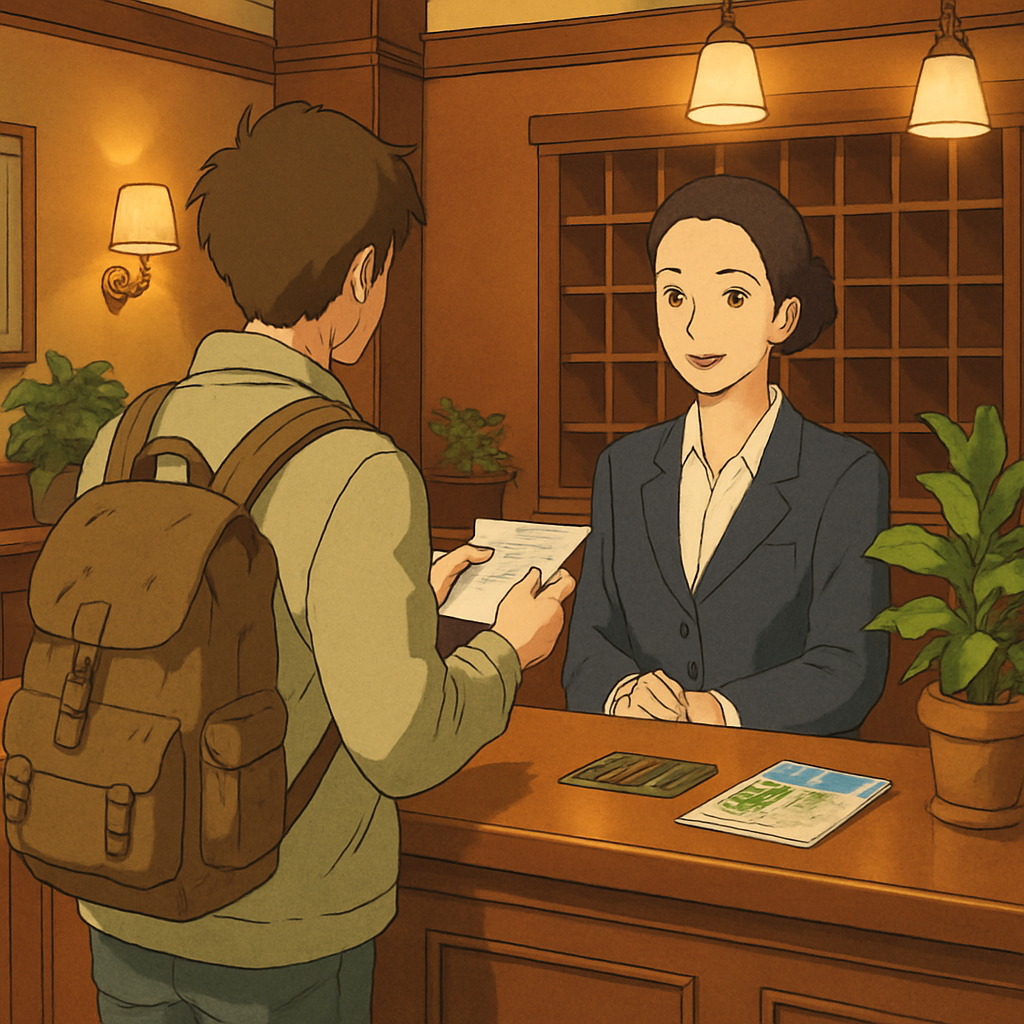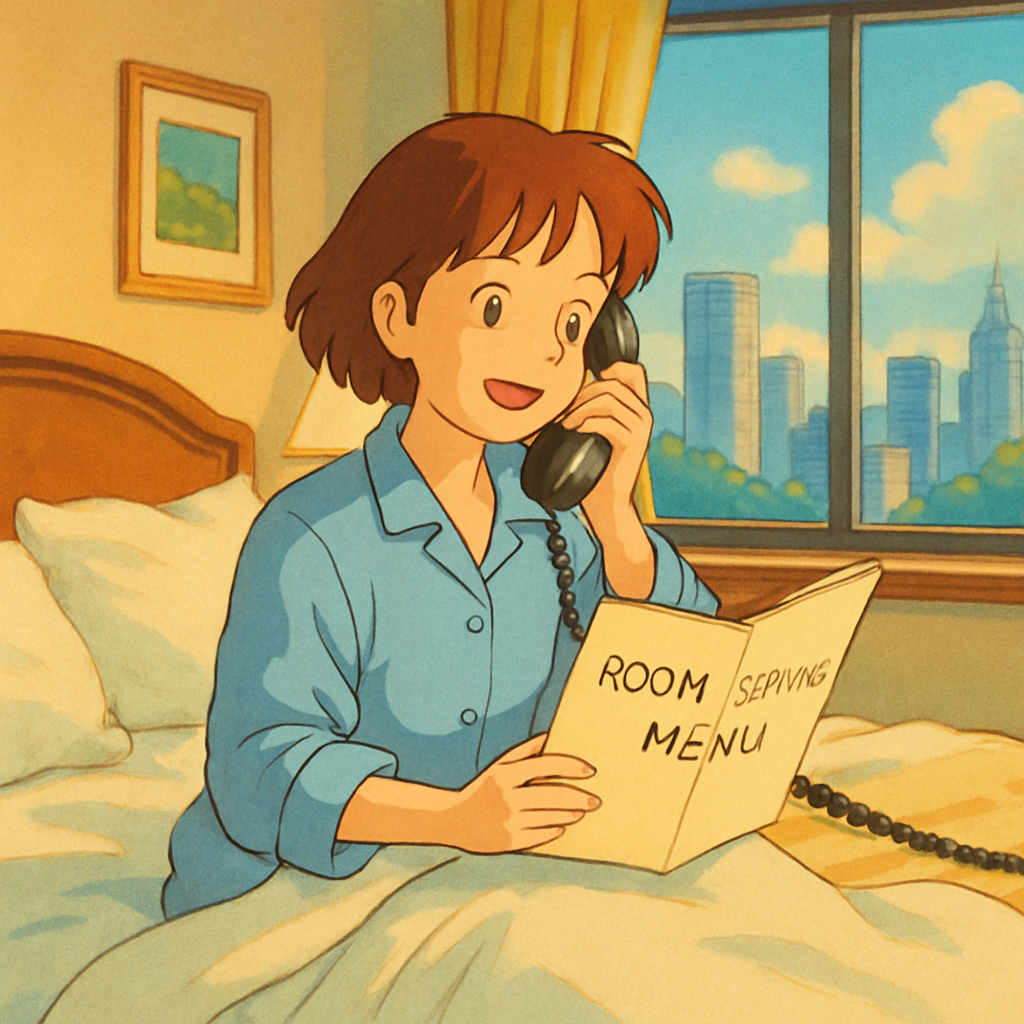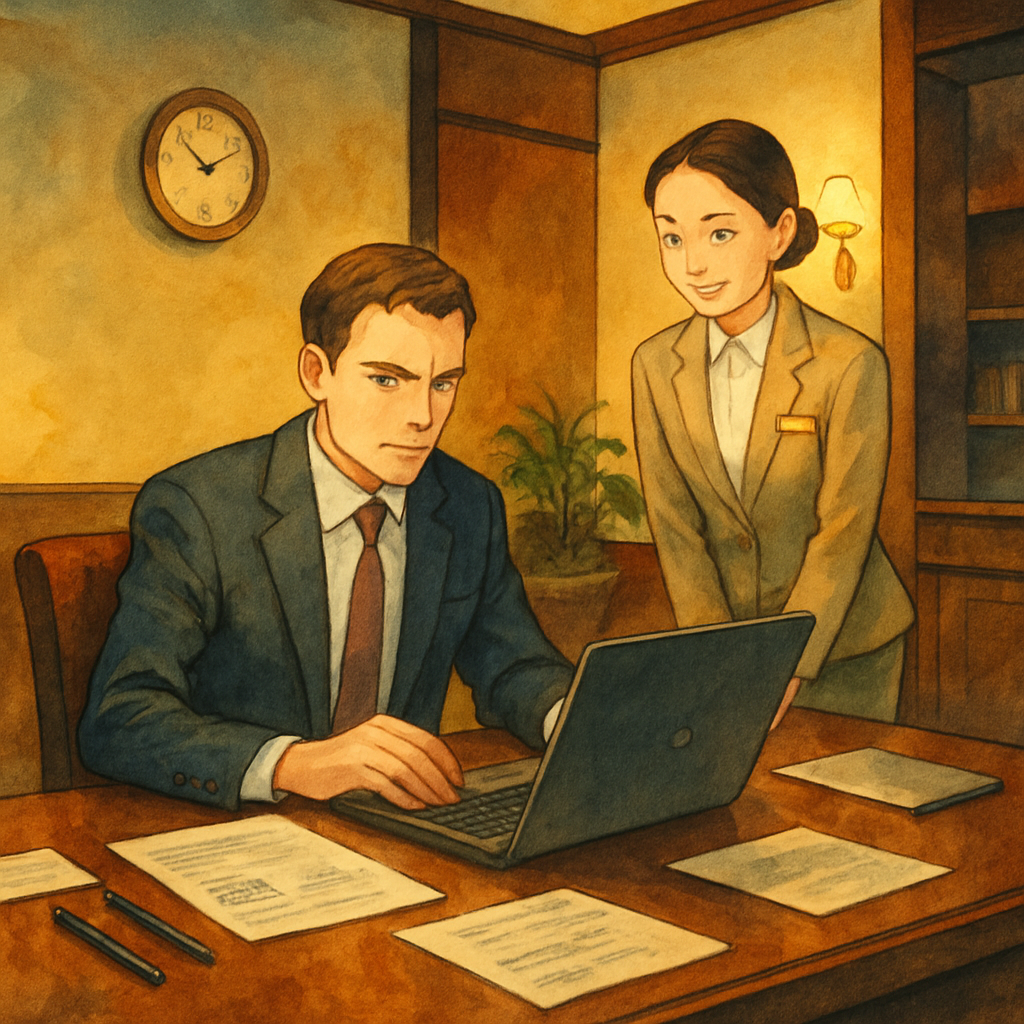Traveling to English-speaking countries can be exciting, but communicating effectively at hotels is crucial for a smooth and enjoyable trip. Whether you’re making a reservation, checking in, ordering room service, or handling unexpected issues, knowing the right English phrases and conversation patterns can transform your travel experience from stressful to confident.
In this comprehensive guide, you’ll discover 6 authentic hotel conversations that cover every essential interaction you’ll have during your stay. These real-life dialogues include practical vocabulary, useful phrases, and cultural insights that will help you communicate naturally and professionally with hotel staff.
Before we analyze each conversation in detail, watch our comprehensive hotel English video featuring all six essential dialogues. Hearing the natural pronunciation, intonation, and flow will help you understand how these conversations sound in real-life situations:
This video demonstrates authentic hotel interactions from phone reservations to check-out, perfect for practicing pronunciation and conversation flow. Don’t forget to subscribe to our YouTube channel for more practical English conversation lessons!
How to Use This Video for Maximum Learning:
- First viewing: Watch without pausing to get the overall flow
- Second viewing: Pause after each conversation section to practice
- Third viewing: Shadow speak along with the dialogue for pronunciation practice
- Fourth viewing: Focus on specific phrases and intonation patterns
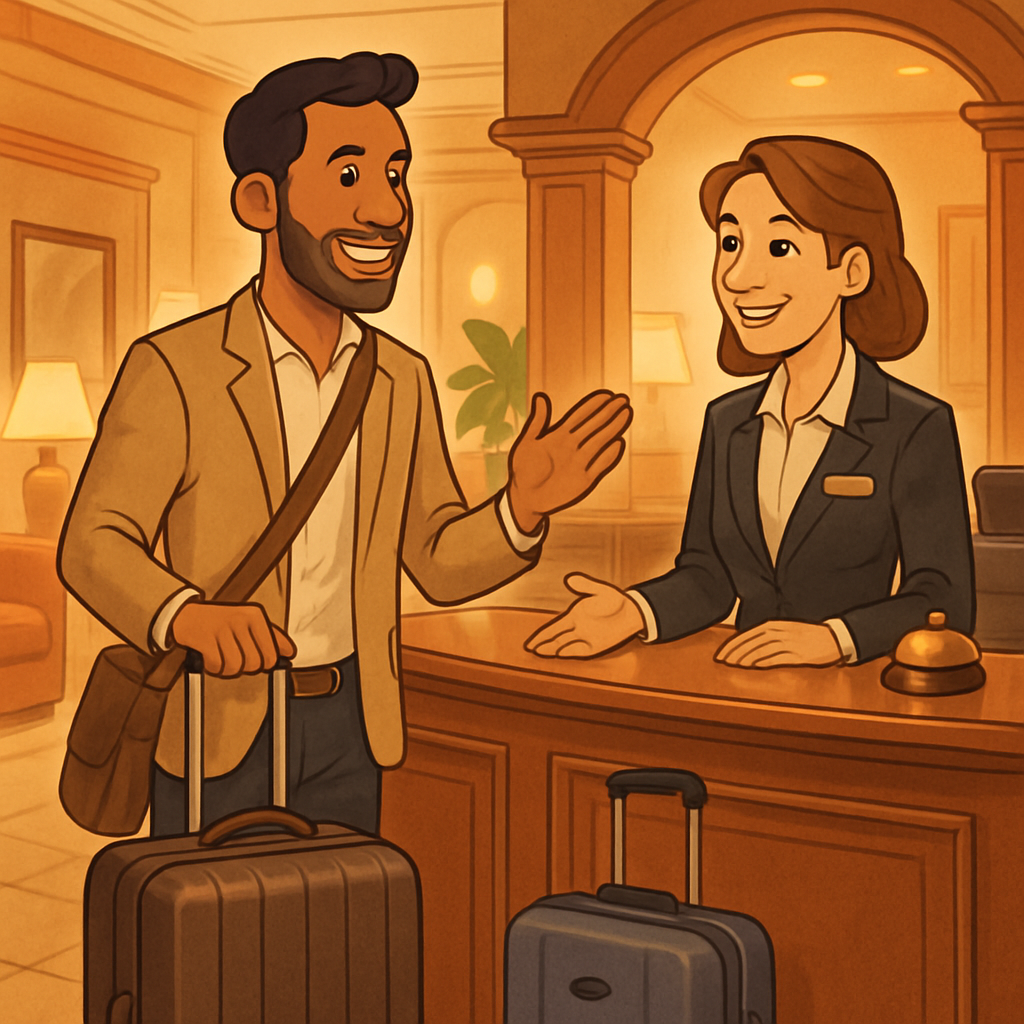
Table of Contents
- Watch the Complete Hotel Conversations Video
- Why Hotel English Conversations Matter for Travelers
- Essential Hotel Vocabulary and Phrases
- Conversation 1: Making a Hotel Reservation by Phone
- Conversation 2: Early Check-in Process
- Conversation 3: Ordering Room Service
- Conversation 4: Reporting Hotel Room Problems
- Conversation 5: Getting Local Recommendations
- Conversation 6: Hotel Check-out Process
- Key Grammar Patterns for Hotel Conversations
- Cultural Tips for Hotel Communication
- Common Mistakes to Avoid
- Practice Exercises and Role-Play Scenarios
- Advanced Hotel English for Business Travelers
- Free Hotel English Worksheet Download
- Hotel English Knowledge Quiz
Why Hotel English Conversations Matter for Travelers
Effective communication at hotels goes far beyond basic tourist interactions. Studies show that travelers who can communicate confidently in English report 40% higher satisfaction with their hotel experiences and are more likely to receive upgraded services and personalized assistance.
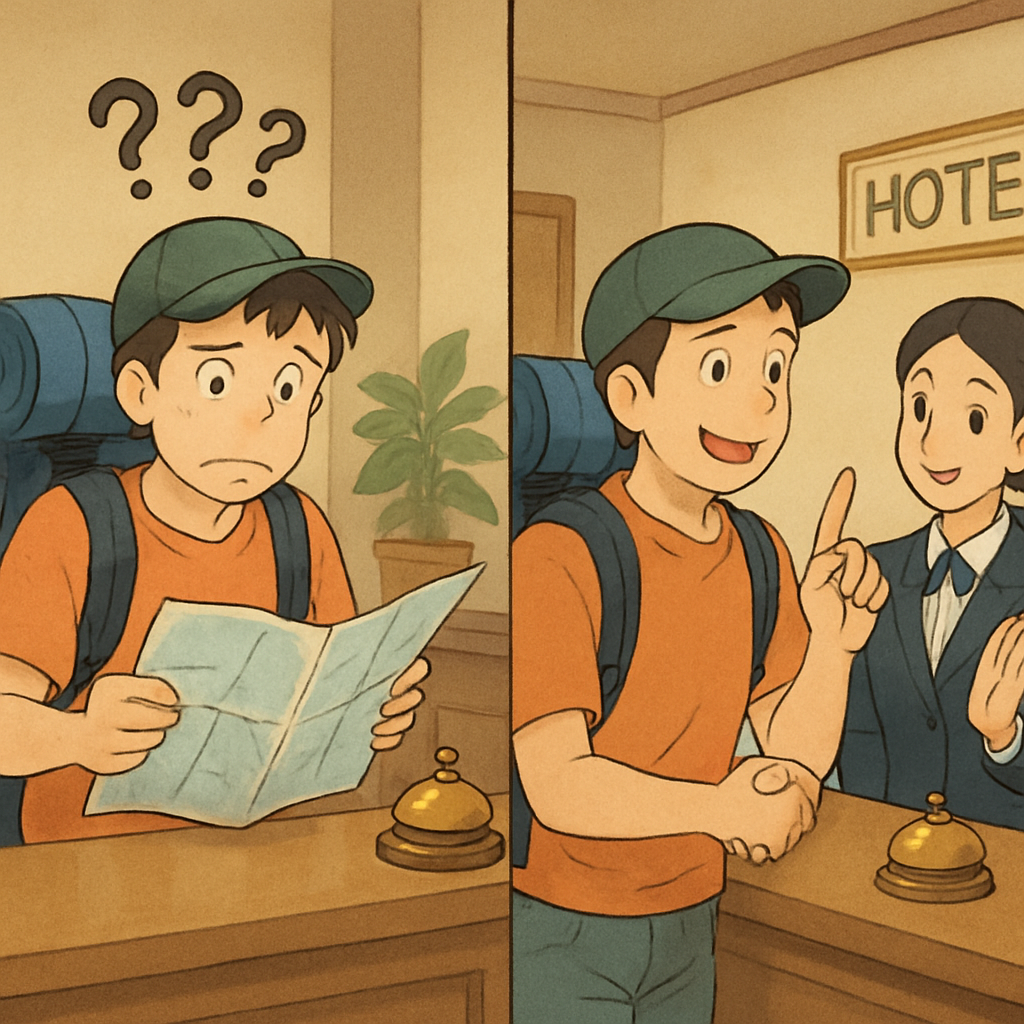
Benefits of Mastering Hotel English:
- Avoid misunderstandings that could affect your reservation or room assignment
- Receive better service by building rapport with hotel staff
- Handle emergencies or problems effectively and quickly
- Access local insights and recommendations from knowledgeable staff
- Negotiate upgrades or special requests with confidence
- Feel more independent and self-assured while traveling
What Makes Hotel English Unique:
Hotel conversations follow specific patterns and use particular vocabulary that differs from everyday English. Understanding these conventions helps you:
- Use appropriate levels of formality
- Navigate service-oriented interactions
- Handle financial transactions smoothly
- Express preferences and special needs clearly
Essential Hotel Vocabulary and Phrases
Before diving into the conversations, let’s review key vocabulary and phrases you’ll encounter in hotel interactions.
Core Hotel Vocabulary:
Room Types:
- Twin room: Two separate single beds
- Double room: One large bed for two people
- Suite: Multiple rooms with separate living area
- Deluxe room: Higher-quality room with additional amenities
- Smoking/Non-smoking room: Designated areas for smokers
Hotel Services:
- Continental breakfast: Light breakfast typically including pastries, fruit, and beverages
- Room service: Food and beverage delivery to your room
- Housekeeping: Cleaning and maintenance services
- Concierge: Staff member who provides information and assistance
- Shuttle service: Transportation provided by the hotel
Hotel Amenities:
- Wi-Fi: Wireless internet connection
- Minibar: Small refrigerator with snacks and drinks
- Complimentary: Free of charge
- City view: Room overlooking the city
- Airport shuttle: Transportation to/from the airport
Essential Polite Phrases:
Making Requests:
- “I was wondering if…”
- “Would it be possible to…”
- “I’d like to…”
- “Could I have…”
- “Is there any chance that…”
Showing Appreciation:
- “I appreciate it”
- “That’s very kind of you”
- “Thank you for your help”
- “I’m grateful for…”
- “That’s really helpful”
Professional Responses:
- “I’d be happy to help”
- “Let me check that for you”
- “Just one moment while I…”
- “I’ll take care of that right away”
- “Is there anything else I can help you with?”
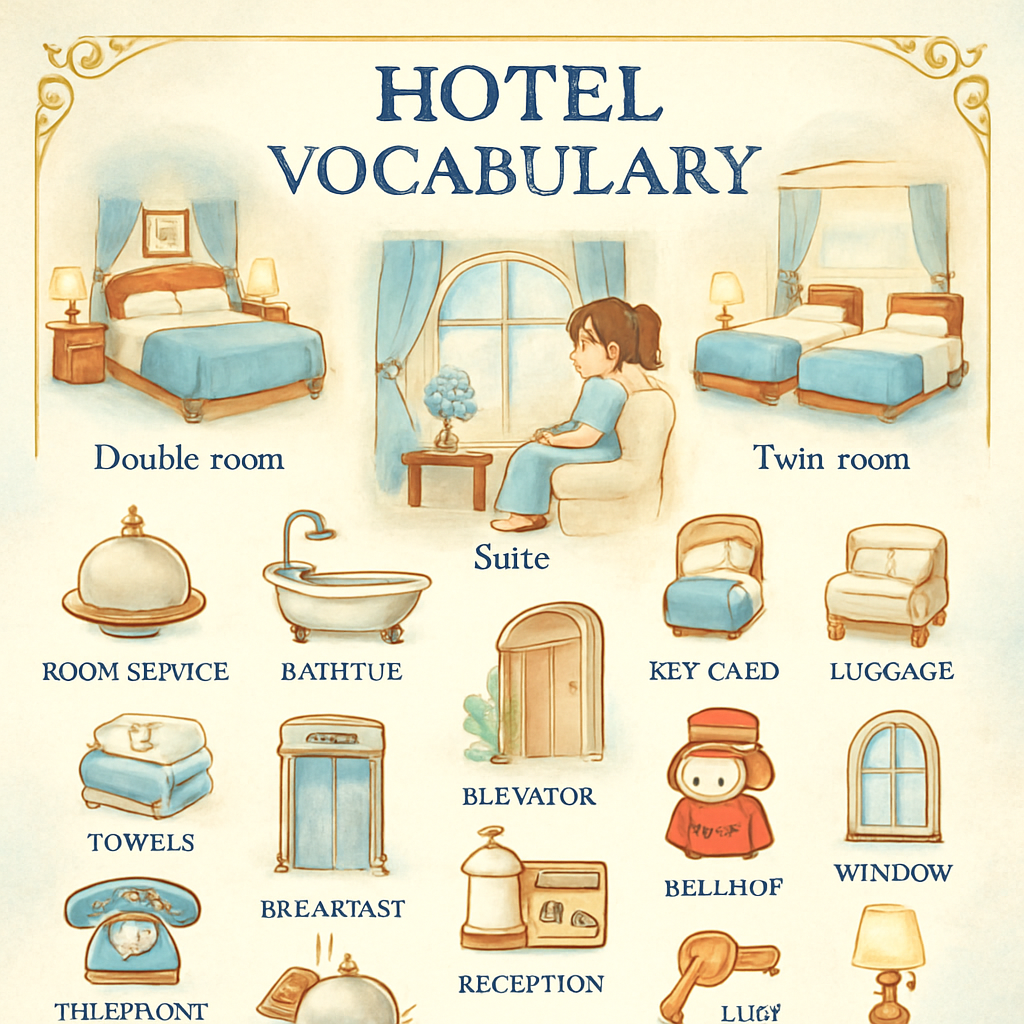
Conversation 1: Making a Hotel Reservation by Phone
This conversation demonstrates how to make a hotel reservation by phone, including asking about availability, room types, rates, and amenities.
🎬 Video Practice Tip: Watch this conversation at timestamp [0:00-2:45] in our YouTube video above. Pay special attention to Sarah’s professional tone and John’s polite inquiry style.
Complete Dialogue:
Hotel Staff (Sarah): Good evening, the Mates Hotel, Sarah speaking. How may I help you?
Guest (John): Hi Sarah, my name’s John. I just have a couple of questions for you. I was wondering if a twin room is available starting Saturday the 20th for five nights.
Sarah: I’d be happy to help. Just give me one moment while I look that up.
John: Sure.
Sarah: Okay, on the 20th for five nights, yes, there are currently two deluxe twin rooms available. However, one is a smoking room.
John: Oh great! How much is the nightly rate for the non-smoking room?
Sarah: It costs $200 per night and includes a continental breakfast. Both rooms do have a great view of the city.
John: That sounds nice. Is Wi-Fi included?
Sarah: There is an extra charge of $10 per day for Wi-Fi use.
John: Oh, that’s fine. I can survive without it for a few days. I’d like to book the non-smoking room, checking in on the 20th and then the five nights following. I’ll check out Thursday morning.
Sarah: Great! I can handle all of that for you. What name would that be under?
John: John Lee.
Sarah: Thank you, Mr. Lee. I have confirmed your reservation for a non-smoking twin deluxe room for five nights at a nightly rate of $200. Your check-in date will be on Saturday, 20th of September, and your check-out date will be on the 25th of September. This includes complimentary continental breakfast during your stay.
John: Yes, that’s all correct. Thank you very much.
Sarah: For your reservation, Mr. Lee, do you have any other questions that I may help you with?
John: Yes, I have one more question. What’s my earliest check-in time?
Sarah: Your earliest check-in time will be 3 p.m.
John: Great! Thank you so much for your help.
Sarah: You’re very welcome, Mr. Lee. If you have any other questions, feel free to call back anytime. Have a great day!
John: Thanks! See you soon.
Key Phrases Analysis:
Starting a Hotel Inquiry:
- “I was wondering if…” – Polite way to ask about availability
- “I just have a couple of questions” – Sets expectations for the conversation
- “starting Saturday the 20th for five nights” – Clear, specific dates
Asking About Room Details:
- “How much is the nightly rate for…” – Direct pricing inquiry
- “Is Wi-Fi included?” – Checking for additional services
- “That sounds nice” – Positive response to maintain rapport
Making the Reservation:
- “I’d like to book the non-smoking room” – Clear decision statement
- “What name would that be under?” – Standard reservation question
- “I have confirmed your reservation” – Professional confirmation language
Useful Reservation Phrases:
- “I’d be happy to help” – Professional service language
- “Just give me one moment while I look that up” – Buying time politely
- “You’re in luck” – Positive way to deliver good news
- “Is there anything else I can help you with?” – Closing service question
Grammar Focus: Future Plans and Availability
Expressing Future Plans:
- “I’ll check out Thursday morning” (Simple future for definite plans)
- “I’d like to book…” (Conditional for polite requests)
- “Your check-in date will be…” (Future for scheduled events)
Asking About Availability:
- “Is a twin room available?” (Present simple for current status)
- “Are there currently two rooms available?” (Present continuous for current situation)
Making Polite Requests:
- “I was wondering if…” (Past continuous for extra politeness)
- “Would it be possible to…” (Conditional for polite inquiries)
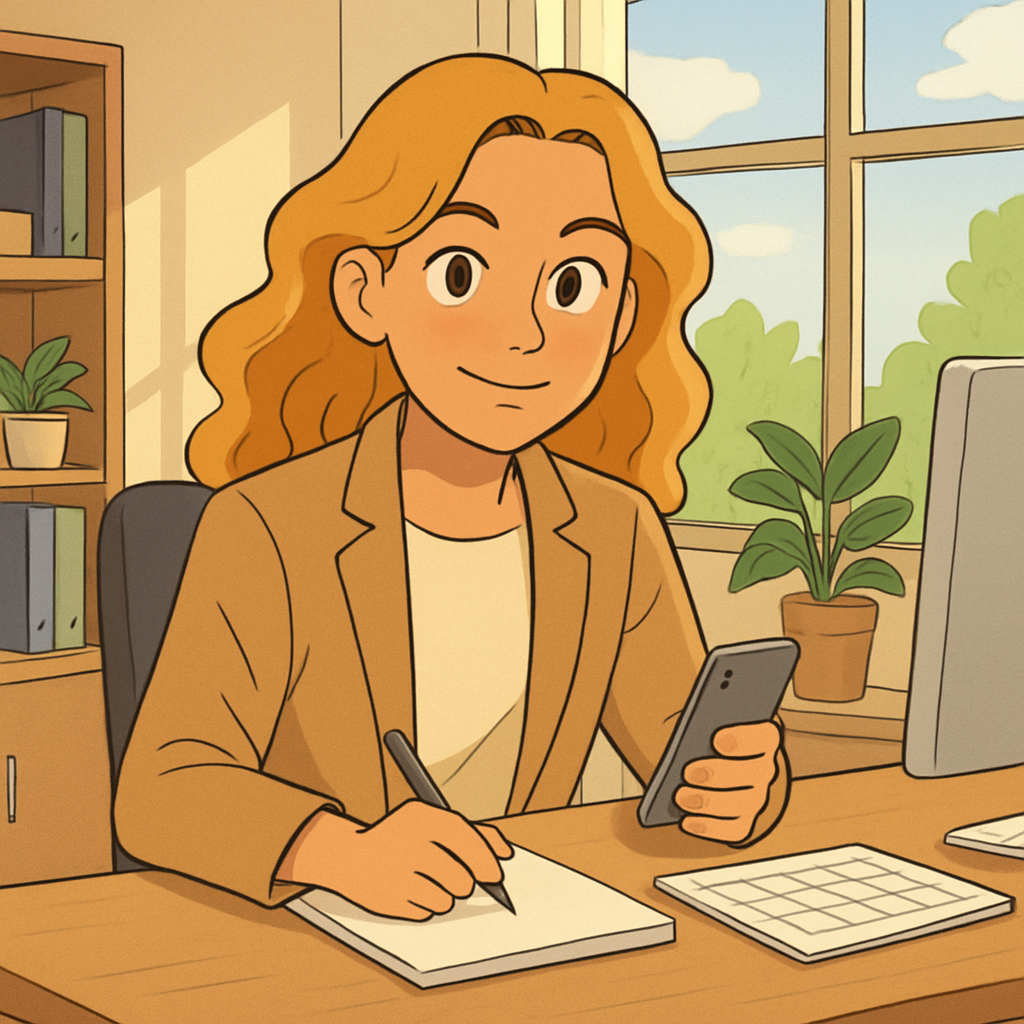
Conversation 2: Early Check-in Process
This conversation shows how to handle early arrival and check-in procedures, including required documentation and hotel information.
🎬 Video Practice Tip: Watch this conversation at timestamp [2:46-4:20] in our YouTube video. Notice how the guest politely requests early check-in and how the staff efficiently handles the process.
Complete Dialogue:
Hotel Staff: Good afternoon, may I help you?
Guest (John): Hello, I’ve arrived earlier than expected from the airport. Would it be possible for me to have an early check-in?
Staff: May I have your reservation name, please?
John: Yes, it’s under John Lee.
Staff: Thank you, Mr. Lee. Just one moment while I check if your room is ready or not.
John: No problem, take your time.
Staff: You’re in luck! Your room is ready. You may check in.
John: That’s great to hear. I appreciate it.
Staff: You’re welcome. Do you have your reservation printed out with you, or may I see your credit card and some form of identification?
John: Of course. Here are my passport and my credit card.
Staff: Thank you. Just to confirm, you have booked a non-smoking twin deluxe room for five nights. Is that correct?
John: That’s right.
Staff: Great! Here are your things back and your room cards. The elevators are right over there to your right.
John: Thank you. Also, continental breakfast will be served on the second floor between 5 AM to 9 AM every morning.
Staff: Thank you very much.
John: You’re welcome. Is there anything else I can help you with, Mr. Lee?
Staff: Yes, I’ll be checking out early at around 6 AM on Thursday morning. Will there be an airport shuttle bus available at that time?
John: Yes, our airport shuttle bus operates from 5 AM every morning and it runs every 20 minutes. You have nothing to worry about.
Staff: Fantastic! Thank you for all your help.
John: You’re very welcome. Enjoy your stay at the Matisse Hotel!
Key Phrases Analysis:
Requesting Early Check-in:
- “I’ve arrived earlier than expected” – Explaining the situation
- “Would it be possible for me to have an early check-in?” – Polite request format
- “You’re in luck!” – Positive response to good news
Check-in Requirements:
- “May I have your reservation name, please?” – Standard identification request
- “Do you have your reservation printed out with you?” – Document verification
- “May I see your credit card and some form of identification?” – Required documents
Confirming Details:
- “Just to confirm…” – Verification language
- “Is that correct?” – Asking for confirmation
- “That’s right” – Confirming accuracy
Hotel Information:
- “Continental breakfast will be served…” – Providing service details
- “The elevators are right over there to your right” – Giving directions
- “You have nothing to worry about” – Reassuring language
Grammar Focus: Polite Requests and Confirmations
Making Polite Requests:
- “Would it be possible for me to…” (Conditional for maximum politeness)
- “Will there be…available?” (Future for scheduled services)
Expressing Gratitude:
- “I appreciate it” (Simple appreciation)
- “Thank you for all your help” (Comprehensive gratitude)
Giving Information:
- “Continental breakfast will be served…” (Passive voice for schedules)
- “Our airport shuttle bus operates from…” (Present simple for regular schedules)
Leonardo AI Image Prompt 5: “A hotel check-in scene showing a traveler presenting documents to a professional receptionist, with key cards and welcome materials on the counter, elegant hotel lobby background”
Conversation 3: Ordering Room Service
This conversation demonstrates how to order food through room service, including menu inquiries, placing orders, and confirming details.
🎬 Video Practice Tip: Watch this conversation at timestamp [4:21-5:30] in our YouTube video. Focus on how Kathy takes the order professionally and how John makes specific requests about cooking preferences.
Complete Dialogue:
Room Service (Kathy): Hello, room service, Kathy speaking.
Guest (John): Hi Kathy, this is John Lee from room 1105. I’d like to order some food. Is it too late to order?
Kathy: No, you may still order. Room service operates until 2 AM.
John: Fantastic! What would you like to order?
Kathy: Just a moment while I look over the menu.
John: Sure.
Kathy: Could I have a Matisse hamburger, medium rare?
John: Certainly. And what would you like for your drink and side dish?
Kathy: French fries for the side and some sparkling water will be fine.
John: Certainly. Would that be all?
Kathy: Yes, that’ll do it.
John: Thank you for your order. Just to confirm, we have a Matisse burger medium well, side of fries, and a sparkling water for room 1105.
Kathy: Almost! I’d like the burger done medium rare.
John: Ah yes, my mistake. My apologies. A Matisse burger medium rare.
Kathy: Great, that’s right.
John: Your meal will be sent to your room within the next 30 minutes.
Kathy: Thank you very much.
John: You’re welcome. Goodbye!
Key Phrases Analysis:
Starting a Room Service Order:
- “This is John Lee from room 1105” – Clear identification
- “I’d like to order some food” – Direct statement of intent
- “Is it too late to order?” – Checking service availability
Taking Orders:
- “What would you like to order?” – Standard service question
- “Just a moment while I look over the menu” – Buying time to decide
- “Could I have…” – Polite ordering phrase
Specifying Preferences:
- “medium rare” – Cooking preference for meat
- “for the side” – Specifying side dish choice
- “will be fine” – Accepting suggestions
Order Confirmation:
- “Just to confirm…” – Verification process
- “Almost!” – Gentle correction
- “My mistake. My apologies” – Professional error acknowledgment
Delivery Information:
- “Your meal will be sent to your room within…” – Time estimate
- “the next 30 minutes” – Specific timeframe
Grammar Focus: Ordering and Preferences
Making Food Orders:
- “I’d like to order…” (Polite ordering structure)
- “Could I have…” (Polite request for food items)
- “Would that be all?” (Checking if order is complete)
Expressing Preferences:
- “medium rare” (Adjective for cooking level)
- “for the side” (Prepositional phrase for specifying)
- “will be fine” (Future tense showing acceptance)
Time Expressions:
- “within the next 30 minutes” (Future time reference)
- “operates until 2 AM” (Present simple for schedules)
Conversation 4: Reporting Hotel Room Problems
This conversation shows how to report maintenance issues and communicate problems effectively with hotel staff.
🎬 Video Practice Tip: Watch this conversation at timestamp [5:31-6:45] in our YouTube video. Notice how John reports the problem politely and how the staff transfers the call efficiently to the right department.
Complete Dialogue:
Housekeeping (Maria): Housekeeping, this is Maria speaking.
Guest (John): Hi Maria, I’m calling from room 1105. I think there’s a problem with the shower in my room. It seems as though the hot water isn’t working.
Maria: Oh, I’m so sorry for the trouble. Would you mind holding for a moment? I need to transfer you to hotel repairs.
John: Okay.
Maria: Sorry about that, one moment.
John: Sure, thank you.
Hotel Repairs (Thomas): Hotel repairs, Thomas speaking.
John: Hi Thomas, I’m calling from room 1105, and I’m having a problem with the shower in my room. It seems as though the hot water isn’t working. I’m only receiving cold water.
Thomas: I’m very sorry to hear that. We can send someone up right away. Also, since I have you, the TV remote doesn’t seem to be working either. No matter what button I press, I can’t seem to get it to work.
John: Ah, that might just mean it needs a new set of batteries. I’ll make sure our maintenance guy brings some up with him.
Thomas: Thanks! We’ll have someone up there in about five minutes.
John: Great, thank you!
Key Phrases Analysis:
Reporting Problems:
- “I think there’s a problem with…” – Gentle problem introduction
- “It seems as though…” – Tentative problem description
- “isn’t working” – Simple problem statement
- “I’m having a problem with…” – Personal problem statement
Apologizing for Issues:
- “I’m so sorry for the trouble” – Empathetic apology
- “I’m very sorry to hear that” – Professional sympathy
Offering Solutions:
- “We can send someone up right away” – Immediate action offer
- “I’ll make sure our maintenance guy brings…” – Proactive solution
- “We’ll have someone up there in about five minutes” – Specific timing
Additional Problems:
- “Since I have you…” – Opportunistic communication
- “No matter what button I press…” – Describing unsuccessful attempts
- “That might just mean…” – Offering possible explanations
Grammar Focus: Problem Description and Solutions
Describing Problems:
- “There’s a problem with…” (There + be structure)
- “It seems as though…” (Tentative language for uncertainty)
- “isn’t working” (Present continuous negative for current issues)
Offering Help:
- “We can send someone…” (Modal for ability/possibility)
- “I’ll make sure…” (Future for promises)
- “We’ll have someone up there…” (Future for scheduled actions)
Time References:
- “right away” (Immediate timing)
- “in about five minutes” (Approximate future time)
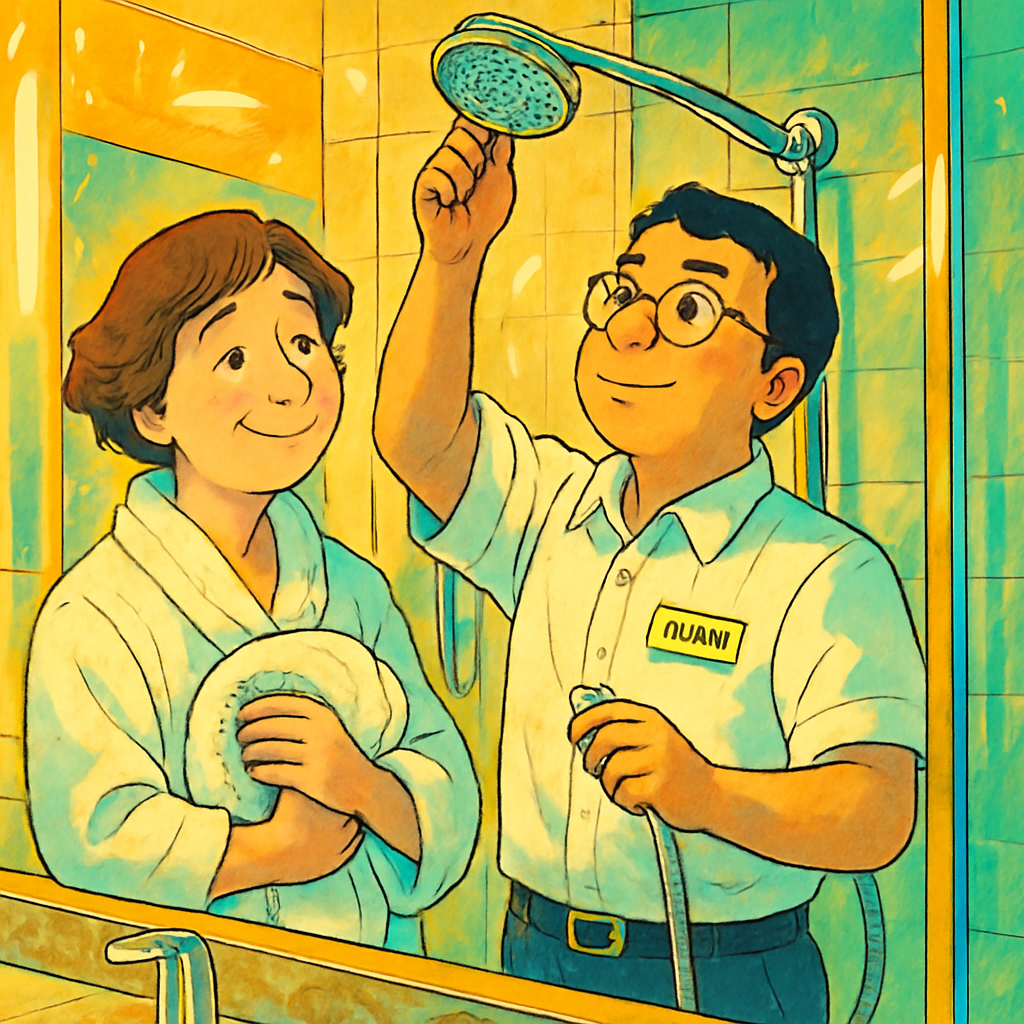
Conversation 5: Getting Local Recommendations
This conversation demonstrates how to ask hotel staff for local recommendations and advice about attractions and activities.
🎬 Video Practice Tip: Watch this conversation at timestamp [6:46-8:30] in our YouTube video. Pay attention to how the concierge provides detailed information about Broadway shows and offers to help secure tickets.
Complete Dialogue:
Concierge: Good morning!
Guest (John): Good morning, sir. How are you today?
Concierge: I’m very well, thank you. How are you doing?
John: Great, thank you for asking. How can I be of service today?
Concierge: Well, it’s my first time in New York, and I really want to watch a Broadway musical. Do you have any good recommendations?
John: Oh yes, there are several shows worth watching if you can get tickets. “A Bronx Tale” and “Mean Girls” are really great, and of course, there’s “Hamilton.” That’s considered the best show in town right now.
Concierge: I’ve heard, but I can’t imagine that’s the easiest show to get into.
John: Yes, well, most of the big shows will have been sold out for months in advance. A handful of Broadway shows host live lottery drawings for discounted seats. You can go to any of the big theaters a couple of hours before the performance and enter your name. There will be lines off to the side. Winners are given the option of buying one or two tickets, often in the first two rows or in the boxes.
Concierge: Oh, that’s nice! Do you suppose I could try that with Hamilton?
John: That one will definitely be the hardest to get into. However, I think it might be possible for me to scrounge you up a ticket to tonight’s show if you want me to try.
Concierge: Oh wow, yes, absolutely! And if it doesn’t work out, you can still try the lottery on some other shows.
John: How many tickets would you require?
Concierge: Only one.
John: And could I get your room number?
Concierge: Room 1105.
John: Excellent! I will call your room in the next 20 minutes and let you know.
Concierge: Thank you so much! That’s really kind of you.
John: Anything for our guests!
Key Phrases Analysis:
Asking for Recommendations:
- “It’s my first time in New York” – Providing context for request
- “I really want to watch…” – Expressing strong interest
- “Do you have any good recommendations?” – Direct request for advice
Giving Recommendations:
- “There are several shows worth watching” – Multiple option introduction
- “That’s considered the best show in town” – Highlighting top choice
- “if you can get tickets” – Conditional caveat
Explaining Difficulties:
- “I can’t imagine that’s the easiest…” – Expressing doubt about difficulty
- “will have been sold out for months” – Future perfect for advance booking
- “That one will definitely be the hardest to get into” – Acknowledging challenge
Offering Special Help:
- “I think it might be possible for me to…” – Tentative offer
- “scrounge you up a ticket” – Informal phrase for finding tickets
- “if you want me to try” – Conditional offer
- “Anything for our guests!” – Service commitment
Grammar Focus: Recommendations and Possibilities
Making Recommendations:
- “There are several shows worth watching” (Worth + gerund structure)
- “That’s considered the best…” (Passive voice for general opinion)
Expressing Possibility:
- “I think it might be possible…” (Modal combinations for uncertainty)
- “if you want me to try” (Conditional for offers)
Future Planning:
- “I will call your room…” (Simple future for promises)
- “in the next 20 minutes” (Time expression)
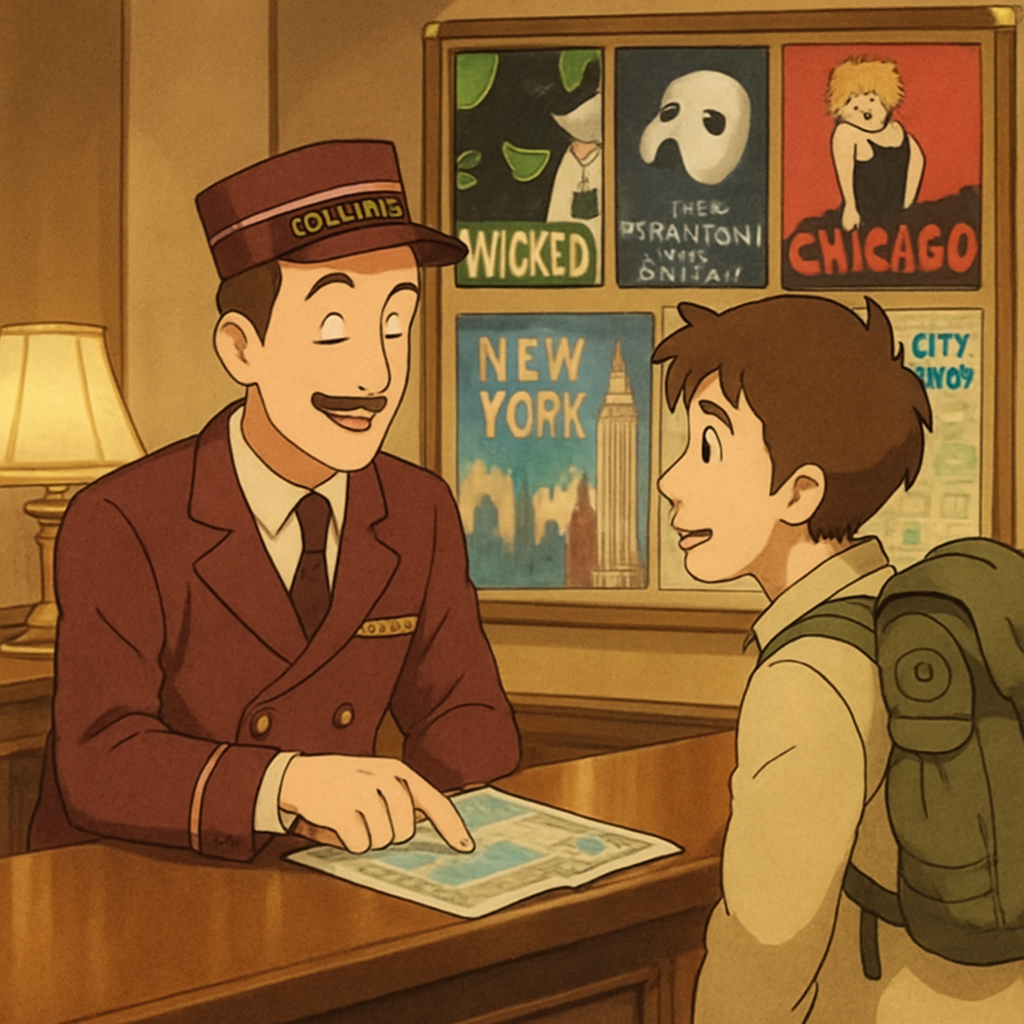
Conversation 6: Hotel Check-out Process
This final conversation covers the complete check-out process, including bill review, payment, and departure information.
🎬 Video Practice Tip: Watch this conversation at timestamp [8:31-10:15] in our YouTube video. Observe how the staff reviews the bill thoroughly and provides helpful departure information.
Complete Dialogue:
Hotel Staff: Hi, I would like to check out.
Guest (John): Certainly. May I have your room key?
Staff: Yes, I have them both right here.
John: Thank you very much. How was your stay, Mr. Lee?
Staff: It was great! I had a slight problem with the hot water on the first night, but it was quickly fixed. Other than that, I really enjoyed my stay.
John: We’re very sorry about the hot water issue, but I’m glad to hear you enjoyed your stay. One last thing, I just need to check the status on the minibar. It doesn’t appear you used it at all.
Staff: No, I didn’t.
John: Thank you. Now to go over your bill: you stayed in one of our twin deluxe non-smoking rooms for five nights, bought one ticket to Hamilton, and ordered room service. Your total bill then comes out to $1,100. How would you like to pay, Mr. Lee?
Staff: I’ll pay by credit card.
John: Thank you very much. If you could sign right here.
Staff: Right here?
John: Yes. Thank you, and here is a copy of your receipt.
Staff: Thank you. One more thing, where do I catch the airport shuttle bus?
John: You’ll be able to catch the shuttle right outside the main hotel entrance. It should arrive within the next five minutes.
Staff: Perfect! Well, thank you very much for staying at the Matisse Hotel, Mr. Lee. We hope you can visit us again soon.
John: I definitely will. You’ve been excellent. Thank you!
Staff: Goodbye, Mr. Lee. Have a safe flight!
John: Thank you for watching. Please subscribe, like and share our videos. OK, see you next time. Bye!
Key Phrases Analysis:
Starting Check-out:
- “I would like to check out” – Direct statement of intent
- “May I have your room key?” – Standard check-out procedure
Reviewing the Stay:
- “How was your stay?” – Standard customer service question
- “I had a slight problem with…” – Acknowledging minor issues
- “but it was quickly fixed” – Positive resolution acknowledgment
- “Other than that, I really enjoyed my stay” – Overall positive feedback
Bill Review Process:
- “I just need to check the status on…” – Verification procedure
- “It doesn’t appear you used it at all” – Observation about services
- “Now to go over your bill” – Bill explanation introduction
- “Your total bill comes out to…” – Final amount statement
Payment Process:
- “How would you like to pay?” – Payment method inquiry
- “I’ll pay by credit card” – Payment choice
- “If you could sign right here” – Signature request
- “Here is a copy of your receipt” – Document provision
Departure Information:
- “Where do I catch the airport shuttle bus?” – Transportation inquiry
- “right outside the main hotel entrance” – Location description
- “It should arrive within the next five minutes” – Timing information
Closing Service:
- “We hope you can visit us again soon” – Future visit encouragement
- “You’ve been excellent” – Service appreciation
- “Have a safe flight!” – Travel well-wishes
Grammar Focus: Past Experience and Future Plans
Describing Past Experience:
- “How was your stay?” (Past simple for completed experience)
- “I had a slight problem…” (Past simple for specific events)
- “it was quickly fixed” (Passive voice past for completed actions)
Present Perfect for Recent Actions:
- “It doesn’t appear you used it” (Present perfect for completed actions with present relevance)
Future Plans and Instructions:
- “You’ll be able to catch…” (Future for instructions)
- “It should arrive within…” (Modal for probability)
- “Have a safe flight!” (Imperative for wishes)
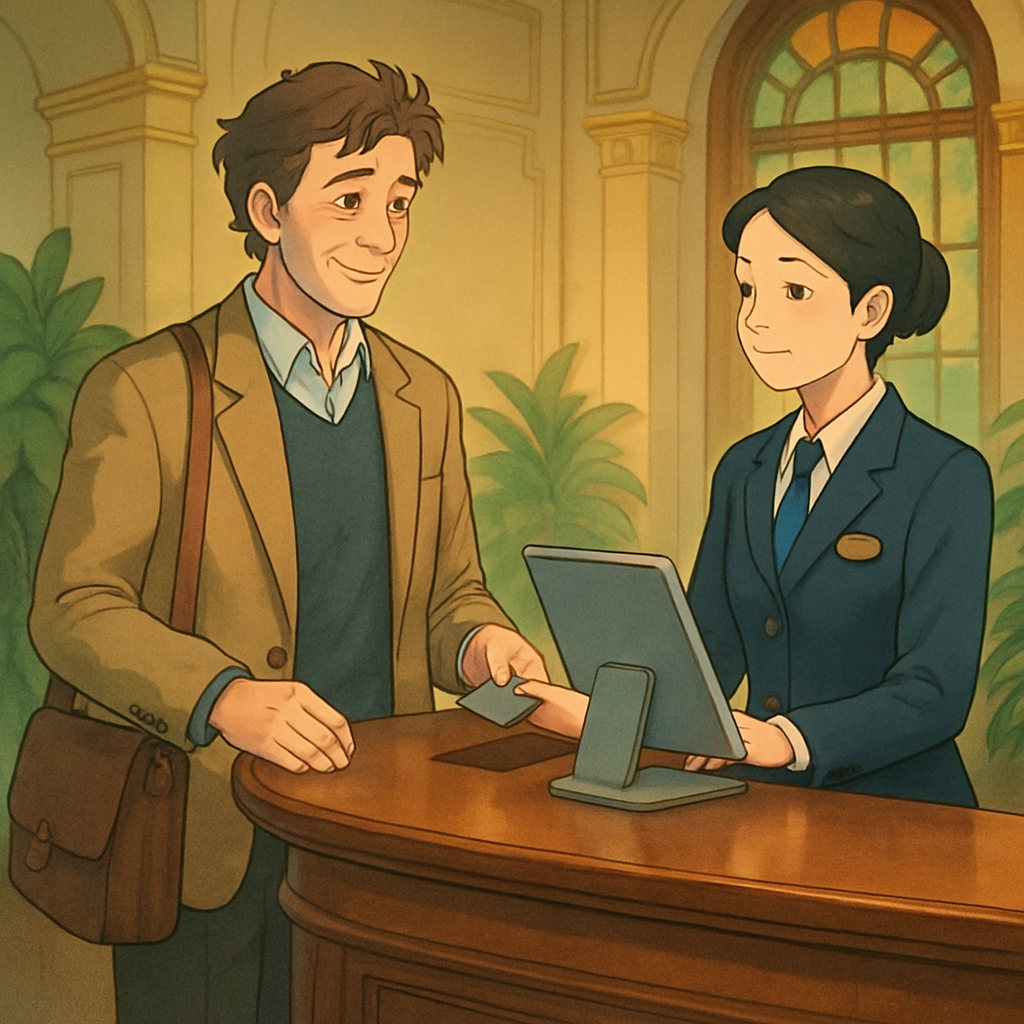
Key Grammar Patterns for Hotel Conversations
Understanding the most common grammar patterns in hotel conversations will help you communicate more naturally and effectively.
1. Polite Request Patterns
Would it be possible…?
- “Would it be possible to have an early check-in?”
- “Would it be possible to get a room with a view?”
- “Would it be possible to extend my stay?”
I was wondering if…
- “I was wondering if you have any rooms available”
- “I was wondering if breakfast is included”
- “I was wondering if you could recommend a restaurant”
Could I have…?
- “Could I have a wake-up call at 7 AM?”
- “Could I have some extra towels?”
- “Could I have the Wi-Fi password?”
2. Service Language Patterns
I’d be happy to…
- “I’d be happy to help you with that”
- “I’d be happy to check availability”
- “I’d be happy to make that reservation”
Let me check…
- “Let me check if your room is ready”
- “Let me check our availability”
- “Let me check with the manager”
I’ll make sure…
- “I’ll make sure housekeeping visits your room”
- “I’ll make sure you get a confirmation email”
- “I’ll make sure the maintenance team fixes that”
3. Confirmation Patterns
Just to confirm…
- “Just to confirm, you have a twin room for five nights”
- “Just to confirm, check-out is at 11 AM”
- “Just to confirm, you’d like a non-smoking room”
Is that correct?
- “Your total comes to $500. Is that correct?”
- “You’re checking in today. Is that correct?”
- “You need transportation to the airport. Is that correct?”
4. Problem Resolution Patterns
I’m sorry to hear that…
- “I’m sorry to hear you’re having problems with the shower”
- “I’m sorry to hear about the noise issue”
- “I’m sorry to hear your key card isn’t working”
We can send someone…
- “We can send someone to fix that right away”
- “We can send housekeeping to your room”
- “We can send maintenance up immediately”
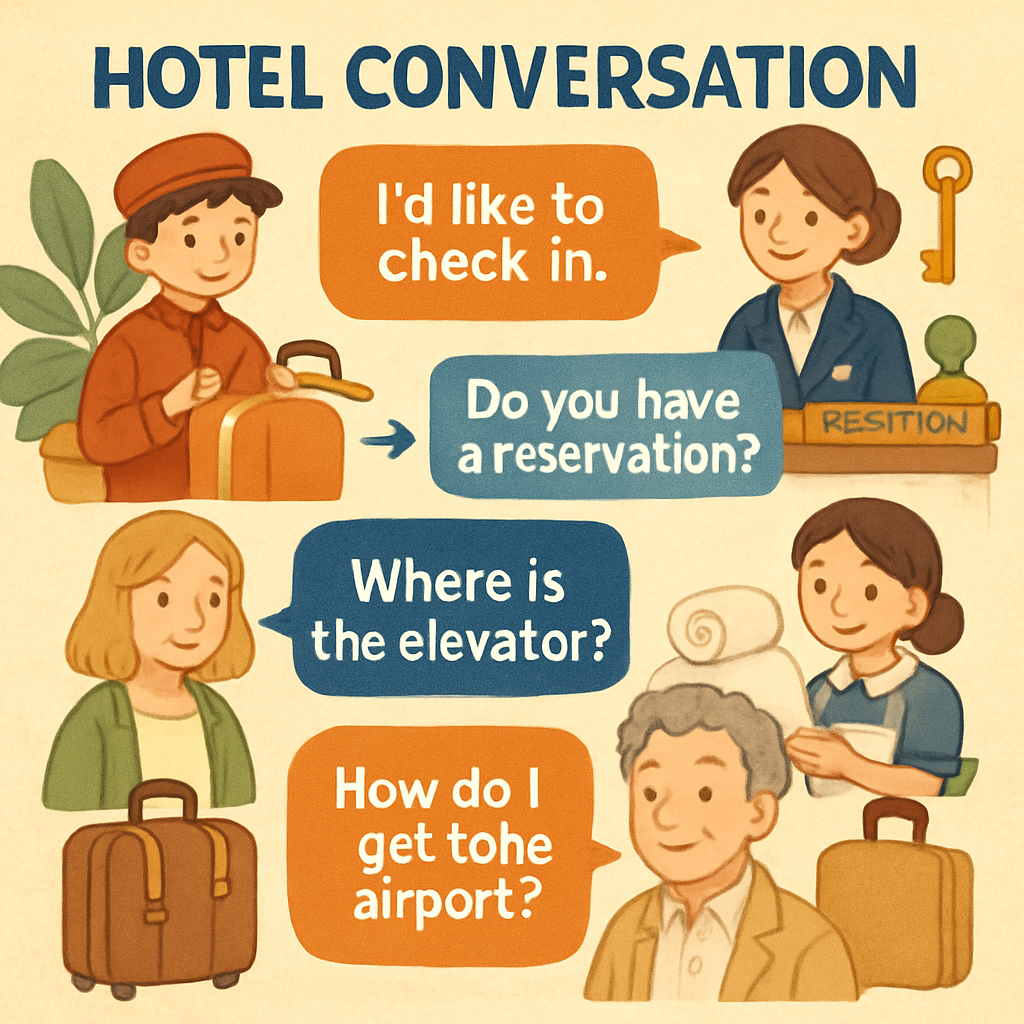
Cultural Tips for Hotel Communication
Understanding cultural expectations can significantly improve your hotel experience and help you communicate more effectively with staff.
North American Hotel Culture:
Tipping Expectations:
- Bellhops: $1-2 per bag
- Housekeeping: $2-5 per day
- Concierge: $5-20 for special services
- Room service: 15-20% (if not included)
Communication Style:
- Direct but polite requests are appreciated
- “Please” and “thank you” are essential
- Casual friendliness is common and welcomed
- Complaints should be stated clearly but politely
British Hotel Culture:
Politeness Levels:
- Extra politeness is valued (“terribly sorry,” “if you wouldn’t mind”)
- Indirect requests are common (“I don’t suppose you could…”)
- Queuing (waiting in line) is very important
- Understated complaints (“slight issue,” “bit of a problem”)
International Business Hotels:
Professional Standards:
- More formal language is expected
- Business attire may be required in certain areas
- International guests are common, so clear pronunciation is important
- Multiple languages may be spoken by staff
Universal Hotel Etiquette:
Do:
- Arrive within your stated timeframe or call if delayed
- Keep your voice at conversational levels in public areas
- Treat all staff members respectfully
- Report problems promptly and politely
- Express appreciation for good service
Don’t:
- Make unreasonable demands or requests
- Raise your voice or become aggressive
- Ignore hotel policies about noise, guests, or amenities
- Leave rooms in extremely poor condition
- Forget to confirm important details
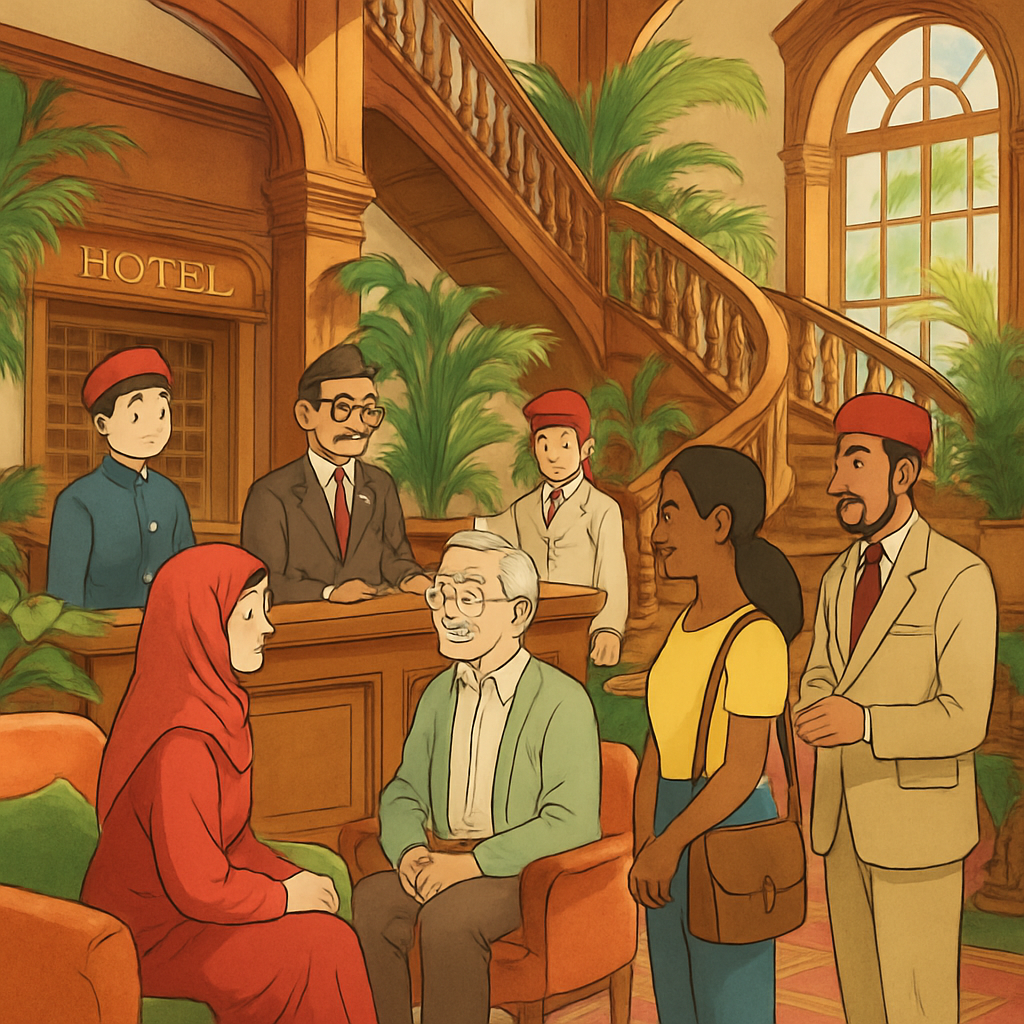
Common Mistakes to Avoid
Learning from common mistakes can help you communicate more effectively and avoid embarrassing situations.
Language Mistakes:
Mistake 1: Confusing Room Types
- Wrong: “I want a double room” (when you need two beds)
- Correct: “I need a twin room” or “I need a room with two beds”
Mistake 2: Unclear Time References
- Wrong: “I arrive in the morning” (too vague)
- Correct: “I’ll arrive at approximately 10 AM”
Mistake 3: Inappropriate Formality Level
- Wrong: “Hey, where’s my room?” (too casual)
- Correct: “Excuse me, could you help me find my room?”
Cultural Mistakes:
Mistake 4: Not Understanding Service Charges
- Problem: Assuming all services are free
- Solution: Always ask “Is there a charge for…” before using services
Mistake 5: Inappropriate Tipping
- Problem: Not knowing local tipping customs
- Solution: Research tipping expectations before travel
Mistake 6: Speaking Too Quietly
- Problem: Hotel staff can’t hear your requests clearly
- Solution: Speak clearly and at adequate volume
Practical Mistakes:
Mistake 7: Not Confirming Details
- Problem: Assumptions about reservation details
- Solution: Always confirm dates, room type, and included services
Mistake 8: Waiting Too Long to Report Problems
- Problem: Reporting issues at check-out when it’s too late to fix them
- Solution: Report problems immediately for quick resolution
Mistake 9: Not Asking for Help
- Problem: Struggling with language barriers instead of asking for assistance
- Solution: Hotel staff are trained to help guests communicate effectively
Practice Exercises and Role-Play Scenarios
Exercise 1: Phone Reservation Practice
Scenario: Call to book a room for your anniversary weekend.
Your Role: You need a deluxe room with city view for 2 nights, arriving Friday, departing Sunday. Ask about romantic packages, room service, and late check-out.
Practice Points:
- Use polite inquiry language
- Ask about special services
- Confirm all details clearly
- Request specific amenities
Exercise 2: Problem Resolution Practice
Scenario: Your air conditioning isn’t working, and you have an important business meeting tomorrow.
Your Role: Call the front desk to report the problem urgently but politely.
Practice Points:
- Explain the urgency without being rude
- Describe the problem clearly
- Ask for estimated repair time
- Request alternative solutions if needed
Exercise 3: Concierge Conversation Practice
Scenario: You’re visiting a city for the first time and want recommendations.
Your Role: Ask the concierge about restaurants, attractions, and transportation options.
Practice Points:
- Provide context about your preferences
- Ask follow-up questions
- Request specific details (price ranges, locations, timing)
- Express appreciation for help
Exercise 4: Check-out Dispute Practice
Scenario: You’re reviewing your bill and notice charges you don’t recognize.
Your Role: Politely question the charges and ask for explanations.
Practice Points:
- Stay calm and polite
- Ask for detailed explanations
- Request documentation if needed
- Negotiate politely if appropriate
Video-Based Practice Exercises
Shadow Speaking with the Video:
- Play the video at 0.75x speed for your first shadow speaking attempts
- Focus on one conversation at a time – don’t try to shadow the entire video
- Pause between speakers to practice your responses
- Record yourself shadowing the conversations and compare with the original
Pronunciation Practice with Video:
- Choose 5 difficult words from each conversation
- Listen to how they’re pronounced in the video
- Practice saying them at the same speed and intonation
- Use the video’s rhythm as your guide for natural speech patterns
Role-Play with Video Guide:
- Mute the guest’s parts and speak their lines yourself
- Practice both roles by switching between guest and staff
- Add variations to the conversations using the same structure
- Time yourself to match the natural pace of the conversations
Advanced Hotel English for Business Travelers
Business travelers often need more sophisticated language skills for professional interactions at hotels.
Executive Service Language:
Making VIP Requests:
- “I’ll be hosting clients in my room and will need…”
- “Could you arrange for a business center workspace?”
- “I require express laundry service for my presentation attire”
- “Would it be possible to have a private dining room reserved?”
Professional Meeting Arrangements:
- “I need to schedule a conference room for tomorrow morning”
- “Could you assist with audiovisual equipment setup?”
- “I’ll need catering for 12 people with dietary restrictions”
- “Can you recommend a quiet location for confidential discussions?”
Corporate Account Language:
Using Company Credentials:
- “I’m traveling on behalf of [Company Name] corporate account”
- “Please charge all expenses to our master account”
- “I need receipts itemized for expense reporting”
- “Could you provide a detailed invoice for accounting purposes?”
International Business Etiquette:
Cultural Sensitivity:
- “I’m hosting international clients who may have specific needs”
- “Could you recommend culturally appropriate dining options?”
- “Are there any business centers with international communication services?”
- “I need to arrange transportation for guests from different countries”
Time Zone Considerations:
- “I need to schedule calls across multiple time zones”
- “Could you provide wake-up calls at unusual hours?”
- “Is there 24-hour business center access?”
- “I require quiet hours for important international calls”
Emergency Business Situations:
Urgent Professional Needs:
- “I have a presentation emergency and need immediate assistance”
- “Could you help me locate emergency printing services?”
- “I need to rearrange my entire schedule due to flight changes”
- “Can you assist with urgent document delivery services?”
Leonardo AI Image Prompt 13: “A professional business traveler in a hotel business center, working on presentations with hotel staff providing assistance, modern executive environment”
Free Hotel English Worksheet Download
Hotel English Practice Worksheet
Part A: Vocabulary Matching Match the hotel terms with their definitions:
- Continental breakfast a. Two separate single beds
- Twin room b. Room cleaning service
- Concierge c. Light breakfast with pastries and beverages
- Housekeeping d. Staff member who provides local information
- Shuttle service e. Transportation provided by the hotel
Part B: Complete the Conversations Fill in the missing phrases:
Guest: Hi, I’d like to __________ a room for tonight. Staff: Certainly. __________ I have your name, please? Guest: It’s John Smith. Staff: Thank you, Mr. Smith. __________ me check availability.
Part C: Role-Play Preparation Prepare responses for these situations:
- Your room key card isn’t working
- You want to extend your stay by one night
- You need recommendations for local restaurants
- You’re checking out and questioning a charge on your bill
Part D: Polite Request Practice Rewrite these direct requests as polite inquiries:
- “Give me a wake-up call at 7 AM” Polite version: _________________________
- “I want a room with a view” Polite version: _________________________
- “Fix the air conditioning now” Polite version: _________________________
Part E: Listening Comprehension Listen to the hotel conversations and answer:
- What type of room did John Lee book?
- How much did he pay per night?
- What problem did he have in his room?
- What show ticket did the concierge help him get?
- What was his total bill amount?
Answer Key: Part A: 1-c, 2-a, 3-d, 4-b, 5-e Part B: book/reserve, May/Could, Let Part D:
- “Could I have a wake-up call at 7 AM, please?”
- “I was wondering if you have any rooms with a view available?”
- “I’m having trouble with the air conditioning. Could someone take a look at it?”
Hotel English Knowledge Quiz
Test your understanding of hotel English with this quick quiz:
Question 1: What’s the polite way to ask about room availability?
a) “Do you have rooms?” b) “I was wondering if you have any rooms available” c) “Give me a room” d) “Where are your rooms?”
Question 2: If you arrive early and want to check in before the official time, you should say:
a) “I’m checking in now” b) “My room better be ready” c) “Would it be possible to have an early check-in?” d) “I demand my room immediately”
Question 3: When reporting a problem with your room, the best approach is:
a) “This room is terrible!” b) “I think there’s a problem with the shower in my room” c) “Everything is broken!” d) “I want a new room right now!”
Question 4: What does “continental breakfast” typically include?
a) Full cooked meal with eggs and meat b) Light breakfast with pastries, fruit, and beverages c) Only coffee and tea d) Room service breakfast
Question 5: When a hotel staff member says “I’d be happy to help,” they are:
a) Expressing personal happiness b) Offering professional assistance c) Being sarcastic d) Asking for help themselves
Quiz Answers:
- b) “I was wondering if you have any rooms available”
- c) “Would it be possible to have an early check-in?”
- b) “I think there’s a problem with the shower in my room”
- b) Light breakfast with pastries, fruit, and beverages
- b) Offering professional assistance
How did you score?
- 5/5: Excellent! You’re ready for confident hotel conversations
- 3-4/5: Good! Review the conversations for polite request patterns
- 1-2/5: Keep practicing! Focus on the key phrases and vocabulary sections
- 0/5: Start with the essential vocabulary section and practice the basic conversations
Conclusion: Master Hotel English for Confident Travel
Mastering hotel English conversations is an essential skill that will transform your travel experiences from stressful encounters into confident, enjoyable interactions. The six authentic dialogues we’ve explored cover every major hotel interaction you’ll encounter, and our accompanying YouTube video provides the perfect pronunciation and intonation guide for these real-world scenarios.
🎥 Don’t forget to watch our complete hotel conversations video above and subscribe to our YouTube channel for more practical English conversation lessons!
The Six Essential Hotel Conversations You’ve Mastered:
- Making reservations with clear communication about dates, preferences, and requirements
- Checking in smoothly with proper documentation and polite requests
- Ordering room service effectively with clear menu choices and special requests
- Reporting problems diplomatically while ensuring quick resolution
- Getting local recommendations from knowledgeable staff for enhanced travel experiences
- Checking out professionally with bill review and departure coordination
Key Takeaways for Hotel Communication Success:
Language Patterns: Focus on polite request structures (“I was wondering if…”, “Would it be possible to…”) and professional response patterns (“I’d be happy to help”, “Let me check that for you”).
Cultural Awareness: Understanding appropriate formality levels, tipping expectations, and communication styles will help you navigate different hotel environments successfully.
Problem Resolution: Approach issues with diplomatic language and clear descriptions while maintaining a collaborative rather than confrontational tone.
Preparation Strategies: Practice common scenarios before travel, prepare key vocabulary, and don’t hesitate to ask for clarification when needed.
Your Next Steps:
- Watch the Video: Start by watching our complete hotel conversations video above for pronunciation guidance
- Practice Daily: Use the conversation patterns in real situations or role-play scenarios
- Build Vocabulary: Focus on hotel-specific terms and polite request structures
- Cultural Research: Learn about tipping and communication customs for your destination
- Confidence Building: Start with simple interactions and gradually tackle more complex scenarios
🔔 Subscribe to our YouTube channel for weekly English conversation practice videos!
📝 Download our free practice worksheet above and take the knowledge quiz to test your hotel English skills.
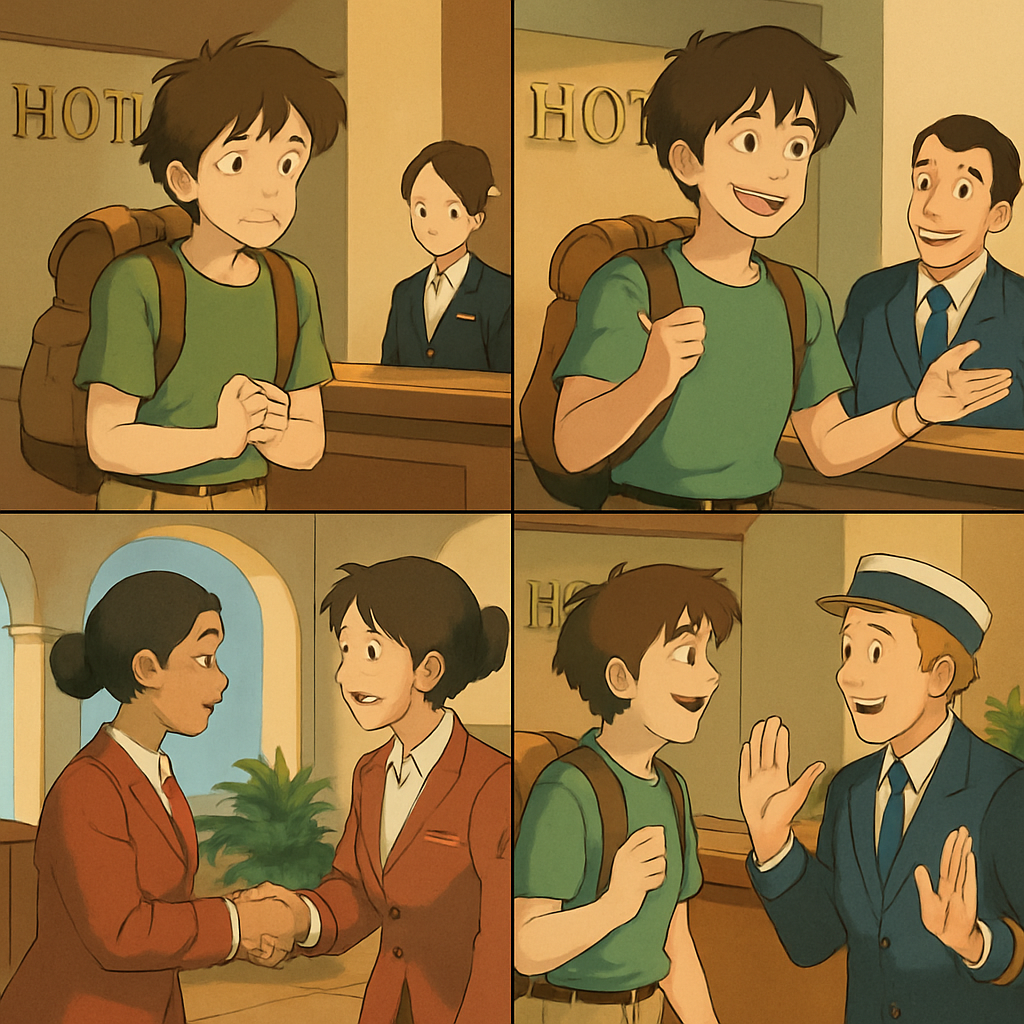
Remember, effective hotel communication isn’t about perfect English—it’s about clear, polite, and respectful interaction that gets your needs met while building positive relationships with service professionals. With these authentic conversations and our video guide, you’re well-equipped to handle any hotel situation with confidence and professionalism.
The hotel industry values guests who communicate clearly and politely, and your efforts to speak English well will often be rewarded with better service, helpful recommendations, and memorable travel experiences. Start practicing these conversations today, and transform your next hotel stay into an opportunity to showcase your English communication skills!
Watch More English Conversation Videos: Subscribe to our YouTube channel for practical English lessons including restaurant conversations, shopping dialogues, and business English scenarios.
Recommended Next Reading: 8 Advanced English Conversations for Real-Life Scenarios – Continue building your conversation skills with our comprehensive guide to advanced English dialogues.
👍 If this article helped you, please like, share, and subscribe for more English learning content!
Business enquiries: support@phrasecamp.com
🔷Facebook page:
https://www.facebook.com/phrasecamp
All material, information and videos are owned by PhraseCamp ©
#phrasecamp #englishphrasecamp
